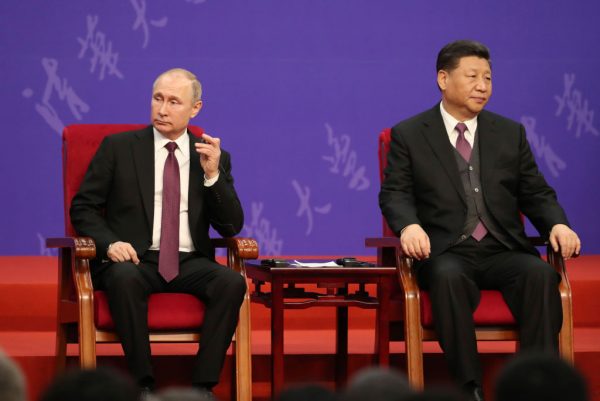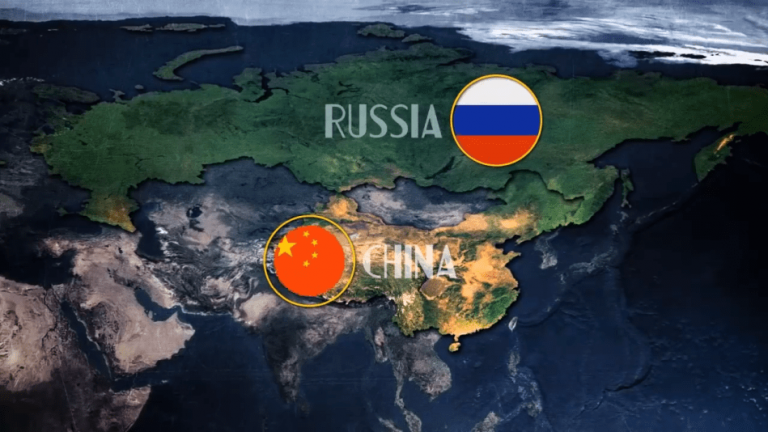A recent intelligence report has indicated that Chinese officials requested in early February that Russian forces wait until after the Beijing Olympics concluded before beginning an invasion into Ukraine, according to sources from the Biden administration and a senior European official.
The report reveals that senior Chinese officials had some “level of direct knowledge” about Russia’s war plans and/or intentions before the invasion began in the early hours of Feb. 24. The intelligence on the exchange between the Chinese and Russian officials was labeled as classified and was collected by a Western intelligence service and considered credible by officials.
According to previous reports, foreknowledge of Russia’s invasion was also given to Beijing by Biden administration officials in a mistaken hope that China would help dissuade the Kremlin from following through with the campaign.
In addition, Russian President Vladimir Putin met with Chinese leader Xi Jinping in Beijing on Feb. 4 before the opening ceremony of the Beijing Olympics. After the meeting, Moscow and Beijing issued a 5,000-word statement declaring that their partnership had “no limits,” denouncing the enlargement of NATO into Eastern Europe, and asserting that the two would establish a new global order with “true democracy.”
READ MORE:
- Xi-Putin Meeting: Russia and China Bolster Ties Amid Rising Tension Over Ukraine
- Xi Tells Putin to Resolve Ukraine Conflict Via ‘Negotiation’, Lifts All Restrictions on Russian Wheat
- In the Face of War, Does China Still Consider Russia an Ally?
One official familiar with the intelligence said the intel did not confirm whether detailed conversations about the Ukrainian invasion took place between Xi and Putin during this meeting. Other officials briefed on the intelligence declined to give further details and the officials who spoke out on the report did so under the condition of anonymity due to the report’s high level of sensitivity.
Success
You are now signed up for our newsletter
Success
Check your email to complete sign up
Given the close nature of the relationship between Russia and China, senior Chinese officials are likely to have briefed Xi on any important exchanges between officials of their nations in the period around the leadership summit, analysts say.

American and European officials have also pointed out that they find it hard to believe that Russia’s timing to invade Ukraine right after the Olympics was mere coincidence. In August 2008, Russia invaded Georgia during the Summer Olympics in Beijing, which upset some Chinese officials.
Liu Pengyu, a spokesman for the Chinese embassy in Washington, said in response to the report, “The claims mentioned in the relevant reports are speculations without any basis, and are intended to blame-shift and smear China.”
Is Beijing detaching from Moscow?
In recent years, Russia and China have bolstered diplomatic ties – holding a series of joint military activities, including naval drills and patrols by long-range bombers over the Sea of Japan and the East China Sea. In August 2021, Russian troops deployed to Chinese territory for joint exercises for the first time.
Even though Moscow and Beijing have rejected the possibility of forging a military alliance in the past, Putin is now saying that the prospect shouldn’t be completely ruled out. He has also noted that Russia has been sharing “highly sensitive military technologies” with China that would help significantly strengthen the two nations’ defense capabilities.
Amid Moscow’s deepening international isolation however, China-Russia relations may be beginning to falter, some observers say. Although Beijing has refrained from calling Putin’s assault on Ukraine an “invasion” and blamed the U.S. and its allies for “inflaming an already tense situation,” China’s state-owned financial institutions have begun quietly distancing themselves from Russian banking institutions as more sanctions are imposed on its already-struggling economy.
The move suggests a careful balancing act by Beijing as it seeks to maintain ties with Moscow in the public eye without openly violating sanctions, which could jeopardize its access to key Western export markets and the US dollar-centric international financial system.
Russian ruble worth less than one cent after punitive sanctions
As the invasion of Ukraine rages into its eight day and casualties on both sides rise exponentially, the Group of Seven, or G7 major economies, have imposed unprecedented punitive sanctions against the Central Bank of Russia, along with widespread measures against the country’s oligarchs and officials, including sanctions placed directly against Putin.
Key Russian banks have been barred from the SWIFT international payments system, (which stands for Society for Worldwide Interbank Financial Telecommunication,) preventing them from accessing secure international communication and ostracizing them from most of the world’s financial system.
Sanctions announced by the U.S. over the weekend also targeted the National Wealth Fund of the Russian Federation and the Ministry of Finance of the Russian Federation. On March 1, U.S. President Joe Biden announced that Russian flights would be banned from U.S. airspace, following similar decisions by the EU and Canada.
Since the invasion began, the Russian ruble has plunged more than 30 percent and hit an all-time low of 109.55 against the dollar on Wednesday (March 2). Russian stocks have also seen massive sell-offs. The Moscow stock exchange was closed for a third consecutive day on Wednesday as authorities looked to stem the bleeding in local asset prices and increase interest rates in hopes of encouraging the public to leave their cash in Russian banks.
Meanwhile, the country’s largest lender, Sberbank, exited its European operations and saw its London-listed shares fall more than 95 percent to trade at a penny. Shares of the country’s other major players on the London Stock Exchange — including Rosneft and Lukoil — have also collapsed.














